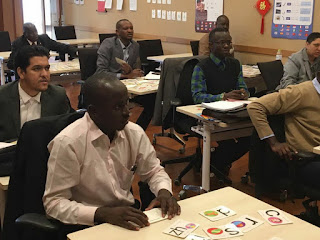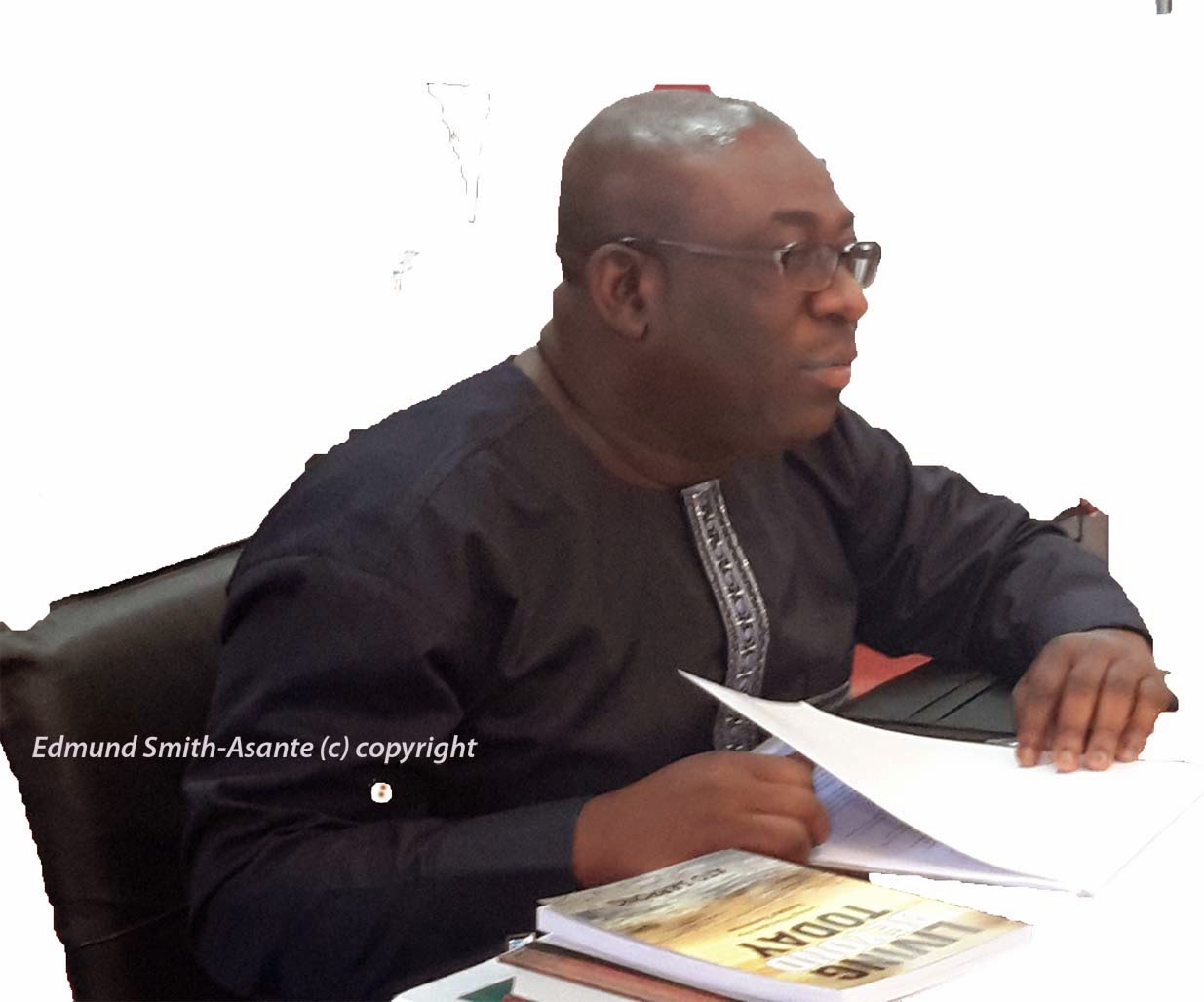Chinese language lessons begin for African, Asian journalists
By Edmund Smith-Asante, BEIJING
Journalists participating in a 10-month media exchange and training programme in China have begun a course in the Mandarine language to enable them to adapt to their new environment.
The course, titled, “Deep Exploration of China Culture Programme,” is being offered by the Beijing International Chinese College (BICC) and would last for the entire period of the programme, which is being organised by the China Africa Press Centre (CAPC) and the China South Asia/South East Asia Press Centre (CSASEAPC), with the support of the China Public Diplomacy Association (CPDA).
During their first day at school, the students, numbering 29 under the CAPC and 15 under the CSASEAPC, were divided into three classes and taken through the basic phonetics that would enable them adapt their tongues to the Chinese language.
The first session was, therefore, used to enable the journalists to familiarise themselves with the consonants and vowels which are respectively referred to as initials because they begin words and finals because they are deemed very important.
Opening
Earlier during the opening ceremony of the language classes, the Vice President of BICC, Ms. Gui Fan, said over the past three years the programme had hosted 60 journalists from 37 countries to learn Chinese and experience Chinese culture at BICC.
“They were also invited to visit Chinese enterprises, families and to have an understanding of the Chinese people. During those programmes we also learnt the different cultures of those journalists and their countries that they brought to us,” she said.
Ms Fan said that kind of learning exchange from the journalists deepened the friendship among them and the Chinese people.
“After just 100 lessons of the Chinese language you will be able to make self-introduction, describe your family, friends and your experience in Chinese, where you have been and what your favourite Chinese food is and so on,” she added.
Language
For his part, the Director of the CPDA, Mr Liu Yutong, narrated his experiences in countries such as Britain, the United States of America and Australia with respect to identifying with their language and manner of speaking which made him accepted.
He, therefore, encouraged the journalists to learn the Chinese language and culture to be easily integrated into the Chinese society.
Language is very important for cultural exchange, he said, adding, “If you want to get a deep understanding of Chinese culture you need to learn Chinese and this is the right place for you to improve on your language ability.”
Quoting a South African proverb, he said: “If a person walks by himself he can walk very fast but if he wants to walk farther it is better to walk with other people.”
Speaking on behalf of the three teachers who would take the journalists through their lessons, the Head teacher of the African journalists and teacher of the first class, Ms Gao Yuan, said learning the Chinese language would help the journalists survive in China if they were on their own because only few Chinese people spoke English, French or other languages.
She said topics that would be treated would include simple words for greetings, time, food, shopping, health, transportation and hobbies.
“Secondly we will be taking you to experience traditional Chinese culture such as experiencing Chinese dressing, cuisine, folk music among others. We will do our best to provide you with the activities to discover and understand China yesterday, today and tomorrow,” she stated.
The journalists would also visit places of interest such as the Forbidden City, the Summer Palace, the Great Wall and national museums and engage in competitions in Chinese culture among the three classes.
Press briefing
The African journalists later attended a session of the daily press briefings held for Chinese journalists by the information department of the Ministry of Foreign Affairs.
This story was first published by Daily Graphic on March 8, 2017
 |
| Students were taken through phoenetics in the first class. |
Journalists participating in a 10-month media exchange and training programme in China have begun a course in the Mandarine language to enable them to adapt to their new environment.
The course, titled, “Deep Exploration of China Culture Programme,” is being offered by the Beijing International Chinese College (BICC) and would last for the entire period of the programme, which is being organised by the China Africa Press Centre (CAPC) and the China South Asia/South East Asia Press Centre (CSASEAPC), with the support of the China Public Diplomacy Association (CPDA).
During their first day at school, the students, numbering 29 under the CAPC and 15 under the CSASEAPC, were divided into three classes and taken through the basic phonetics that would enable them adapt their tongues to the Chinese language.
The first session was, therefore, used to enable the journalists to familiarise themselves with the consonants and vowels which are respectively referred to as initials because they begin words and finals because they are deemed very important.
Opening
Earlier during the opening ceremony of the language classes, the Vice President of BICC, Ms. Gui Fan, said over the past three years the programme had hosted 60 journalists from 37 countries to learn Chinese and experience Chinese culture at BICC.
“They were also invited to visit Chinese enterprises, families and to have an understanding of the Chinese people. During those programmes we also learnt the different cultures of those journalists and their countries that they brought to us,” she said.
Ms Fan said that kind of learning exchange from the journalists deepened the friendship among them and the Chinese people.
“After just 100 lessons of the Chinese language you will be able to make self-introduction, describe your family, friends and your experience in Chinese, where you have been and what your favourite Chinese food is and so on,” she added.
Language
For his part, the Director of the CPDA, Mr Liu Yutong, narrated his experiences in countries such as Britain, the United States of America and Australia with respect to identifying with their language and manner of speaking which made him accepted.
He, therefore, encouraged the journalists to learn the Chinese language and culture to be easily integrated into the Chinese society.
Language is very important for cultural exchange, he said, adding, “If you want to get a deep understanding of Chinese culture you need to learn Chinese and this is the right place for you to improve on your language ability.”
Quoting a South African proverb, he said: “If a person walks by himself he can walk very fast but if he wants to walk farther it is better to walk with other people.”
 |
| Ms. Gao Yuan, head teacher taking students through the rudiments of the Chinese language |
She said topics that would be treated would include simple words for greetings, time, food, shopping, health, transportation and hobbies.
“Secondly we will be taking you to experience traditional Chinese culture such as experiencing Chinese dressing, cuisine, folk music among others. We will do our best to provide you with the activities to discover and understand China yesterday, today and tomorrow,” she stated.
The journalists would also visit places of interest such as the Forbidden City, the Summer Palace, the Great Wall and national museums and engage in competitions in Chinese culture among the three classes.
Press briefing
The African journalists later attended a session of the daily press briefings held for Chinese journalists by the information department of the Ministry of Foreign Affairs.
This story was first published by Daily Graphic on March 8, 2017



Comments
Post a Comment